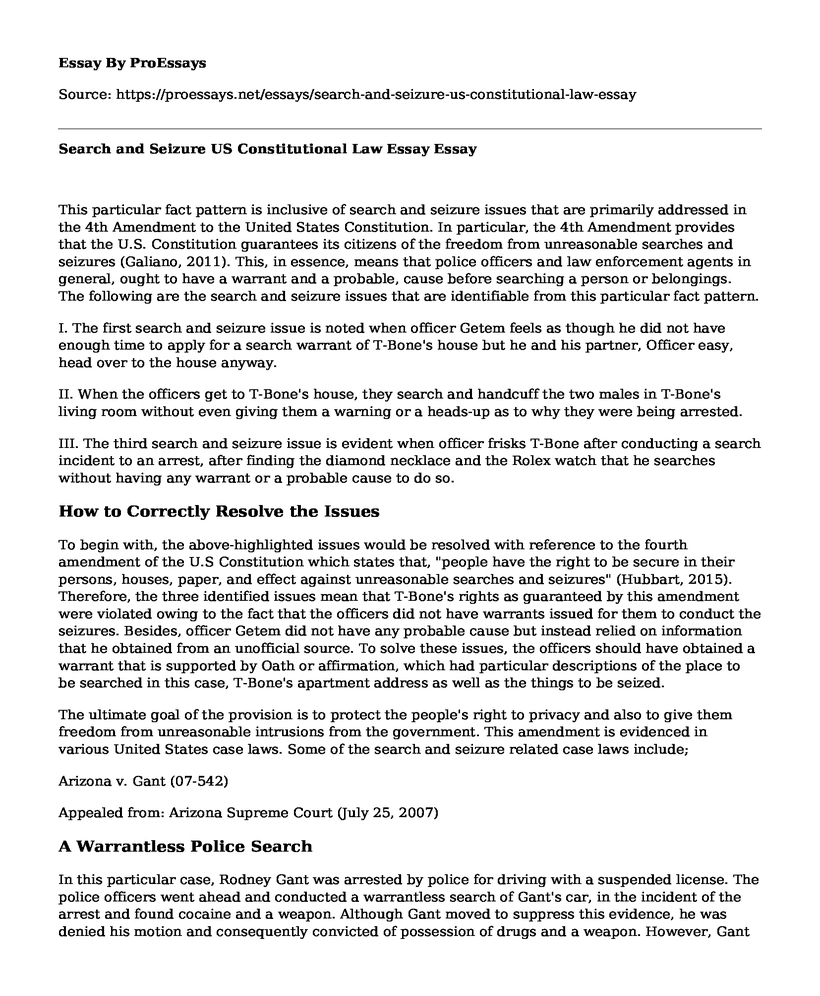This particular fact pattern is inclusive of search and seizure issues that are primarily addressed in the 4th Amendment to the United States Constitution. In particular, the 4th Amendment provides that the U.S. Constitution guarantees its citizens of the freedom from unreasonable searches and seizures (Galiano, 2011). This, in essence, means that police officers and law enforcement agents in general, ought to have a warrant and a probable, cause before searching a person or belongings. The following are the search and seizure issues that are identifiable from this particular fact pattern.
I. The first search and seizure issue is noted when officer Getem feels as though he did not have enough time to apply for a search warrant of T-Bone's house but he and his partner, Officer easy, head over to the house anyway.
II. When the officers get to T-Bone's house, they search and handcuff the two males in T-Bone's living room without even giving them a warning or a heads-up as to why they were being arrested.
III. The third search and seizure issue is evident when officer frisks T-Bone after conducting a search incident to an arrest, after finding the diamond necklace and the Rolex watch that he searches without having any warrant or a probable cause to do so.
How to Correctly Resolve the Issues
To begin with, the above-highlighted issues would be resolved with reference to the fourth amendment of the U.S Constitution which states that, "people have the right to be secure in their persons, houses, paper, and effect against unreasonable searches and seizures" (Hubbart, 2015). Therefore, the three identified issues mean that T-Bone's rights as guaranteed by this amendment were violated owing to the fact that the officers did not have warrants issued for them to conduct the seizures. Besides, officer Getem did not have any probable cause but instead relied on information that he obtained from an unofficial source. To solve these issues, the officers should have obtained a warrant that is supported by Oath or affirmation, which had particular descriptions of the place to be searched in this case, T-Bone's apartment address as well as the things to be seized.
The ultimate goal of the provision is to protect the people's right to privacy and also to give them freedom from unreasonable intrusions from the government. This amendment is evidenced in various United States case laws. Some of the search and seizure related case laws include;
Arizona v. Gant (07-542)
Appealed from: Arizona Supreme Court (July 25, 2007)
A Warrantless Police Search
In this particular case, Rodney Gant was arrested by police for driving with a suspended license. The police officers went ahead and conducted a warrantless search of Gant's car, in the incident of the arrest and found cocaine and a weapon. Although Gant moved to suppress this evidence, he was denied his motion and consequently convicted of possession of drugs and a weapon. However, Gant references the Fourth Amendment and claims that the search was unreasonable for an unrelated charge and also since neither the integrity evidence nor the officer safety was imperiled.
Issues from This Case Law
Should a law enforcement officer conduct an automobile search as an incident to all lawful arrests or must the officer fear for his own safety or should he consider the integrity of the evidence prior to carrying out a search or a seizure on the automobile?
References
Galiano, D. (2011). The Bill of Rights: Unreasonable Search and Seizure (The Fourth Amendment). Rosen Pub. Group.
Hubbart, P. A. (2015). Making sense of search and seizure law: A Fourth Amendment handbook (2nd ed.). Carolina Academic Press.
Cite this page
Search and Seizure US Constitutional Law Essay. (2022, May 17). Retrieved from https://proessays.net/essays/search-and-seizure-us-constitutional-law-essay
If you are the original author of this essay and no longer wish to have it published on the ProEssays website, please click below to request its removal:
- Paper Sample - Legalization of Marijuana in the US
- Essay Sample on Current Crime in South Africa
- Supreme Court Upholds Abortion Ban: 14th Amendment Violated? - Research Paper
- Espinoza v. Montana Department of Revenue Case Study
- Obama Care: US Healthcare Reforms and Its Impact - Essay Sample
- Paper Example on Online Drug Trade: The Impact of Internet Technology
- Free Essay on Governing a State: Ethical Dilemmas and Legal Challenges







